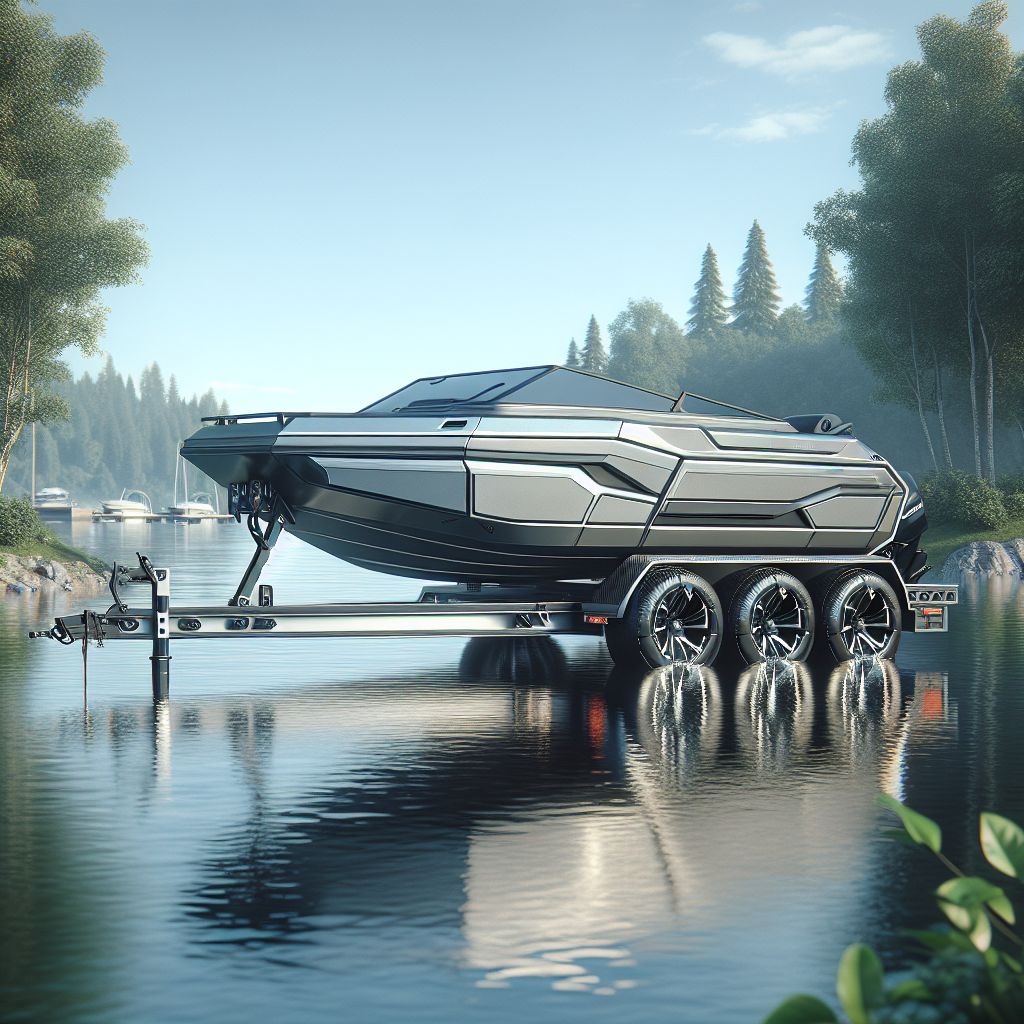Maintaining optimal tire pressure is crucial for the safety and performance of any trailer, including boat trailers. A well-functioning tire pressure monitoring system for boat trailers plays an essential role in this maintenance. By constantly monitoring tire pressure, these systems alert users to any significant deviations that may lead to dangerous driving conditions.
One of the primary benefits of utilizing a tire pressure monitoring system is the prevention of blowouts. Under-inflated tires can overheat and ultimately fail, leading to potentially catastrophic accidents. Regular monitoring helps ensure that tires are inflated to the manufacturer’s recommended specifications, which not only enhances safety but also improves fuel efficiency.
Additionally, a tire pressure monitoring system can contribute to the longevity of your trailer's tires. Properly inflated tires wear evenly, prolonging their lifespan and saving you money in the long run. Moreover, these systems can also monitor other critical metrics, such as temperature and load, providing comprehensive data that can be vital for safe towing.
By investing in a tire pressure monitoring system, you are not just adding a feature to your boat trailer; you are enhancing your overall towing experience. Tow with peace of mind, knowing that trailerwatchdog is standing guard.
How Tire Pressure Affects Boat Trailer Performance

The performance of a boat trailer is significantly influenced by tire pressure, a factor that is often overlooked by many trailer owners. When tire pressure is within the recommended range, the trailer can maintain optimal traction, stability, and handling on the road. This is especially important when towing a heavy boat, as improper tire pressure can lead to a variety of performance issues.
Under-inflated tires increase rolling resistance, making it harder for the towing vehicle to pull the trailer. This not only affects fuel efficiency but can also lead to increased wear and tear on both the trailer and the vehicle. Furthermore, low tire pressure can cause poor handling, making it difficult to navigate turns, particularly on uneven surfaces or during sudden maneuvers.
On the other hand, over-inflated tires can also pose a serious problem. They can result in a harsh ride, reduced traction, and increased risk of tire blowouts. Over-inflation decreases the contact patch between the tire and the road, compromising grip and increasing the chance of skidding, especially in wet conditions.
Maintaining the right tire pressure ensures that the trailer operates smoothly and effectively, providing a safer towing experience. By using a tire pressure monitoring system, owners can easily keep track of tire conditions, allowing for timely adjustments and optimal performance on every journey.
Key Features of Effective Tire Pressure Monitoring Systems

An effective tire pressure monitoring system for boat trailers is essential for enhancing safety and performance. Here are some key features that make these systems invaluable for trailer owners:
- Real-Time Monitoring: The best systems provide continuous, real-time data on tire pressure and temperature, allowing users to make immediate adjustments if needed.
- Alerts and Notifications: Effective systems come equipped with alerts that notify the driver of any significant changes in tire pressure or temperature, helping to prevent potential hazards before they escalate.
- Easy Installation: A user-friendly design ensures that the monitoring system can be easily installed on various types of trailers without requiring extensive modifications.
- Wireless Connectivity: Many modern systems utilize wireless technology to transmit data to a mobile app or dashboard, providing convenient access to tire information from anywhere within the towing vehicle.
- Durability: Given the harsh conditions trailers often encounter, robust and weather-resistant sensors are crucial for reliable performance over time.
- Battery Life: Long-lasting battery life is essential for maintaining functionality without frequent replacements, ensuring that the system remains operational during long trips.
These features combined create a comprehensive monitoring system that not only enhances the safety of the trailer but also extends the life of the tires, making it a worthwhile investment for any boat trailer owner.
Benefits of Installing Tire Pressure Monitoring Systems
Installing a tire pressure monitoring system for boat trailers offers numerous advantages that significantly enhance the overall trailer experience. Here are the primary benefits of adopting this technology:
- Improved Safety: By continuously monitoring tire pressure, these systems help prevent blowouts and loss of control, ensuring a safer towing experience.
- Increased Fuel Efficiency: Properly inflated tires reduce rolling resistance, leading to better fuel economy. This not only saves money but also reduces environmental impact.
- Extended Tire Life: Regular monitoring helps maintain optimal tire pressure, which can prevent uneven wear and tear, ultimately extending the lifespan of your tires.
- Enhanced Performance: Consistent tire pressure contributes to better handling and stability while towing, allowing for more confident maneuvering on various terrains.
- Cost Savings: Preventative maintenance through a tire pressure monitoring system can lead to significant savings by avoiding costly repairs due to tire damage or accidents.
- Peace of Mind: Knowing that your trailer's tires are being monitored in real-time allows for a more relaxed towing experience, enabling you to focus on the journey ahead.
Incorporating a tire pressure monitoring system into your boat trailer not only enhances safety but also promotes efficiency, longevity, and overall peace of mind during your travels.
Choosing the Right Tire Pressure Monitoring System

Selecting the appropriate tire pressure monitoring system for boat trailers can be a crucial decision that impacts safety and performance. Here are several factors to consider when making your choice:
- Compatibility: Ensure that the system is compatible with your specific trailer type and tire size. Different systems cater to various trailer configurations, so check the specifications before purchasing.
- Real-Time Monitoring: Look for a system that provides real-time tire pressure updates. This feature allows you to address any issues before they escalate into serious problems.
- Ease of Installation: Choose a system that offers straightforward installation processes. Some systems may require professional installation, while others can be easily set up by the user.
- Durability: Given the rugged environments that boat trailers often encounter, it's important to select a system built to withstand harsh conditions. Look for features like weather resistance and robust design.
- Alarm Features: A good tire pressure monitoring system should have alarm features that notify you of abnormal tire pressures, giving you ample time to react.
- Battery Life: Consider the battery life of the monitoring sensors. Longer battery life means less frequent replacements and reduced maintenance effort.
By carefully evaluating these factors, you can choose a tire pressure monitoring system that best fits your needs, ensuring a safer and more efficient towing experience.
Maintaining Your Boat Trailer Tire Pressure Monitoring System

To ensure your tire pressure monitoring system for boat trailers continues to function effectively, regular maintenance is essential. Here are some key steps to maintain your system:
- Regular Checks: Frequently check the system's sensors and monitor the tire pressure readings. This helps to identify any discrepancies early on.
- Battery Maintenance: If your system operates on batteries, ensure they are regularly checked and replaced as needed to avoid unexpected failures.
- Cleaning Sensors: Keep the sensors clean and free from debris. Dirt or corrosion can affect their performance and accuracy.
- Firmware Updates: Some systems may require software updates to improve functionality or fix bugs. Check the manufacturer’s website for any available updates.
- Inspect for Damage: Regularly inspect the wiring and components of your monitoring system for any signs of wear or damage. Promptly address any issues to maintain optimal performance.
Proper maintenance of your tire pressure monitoring system not only extends its life but also enhances the safety and efficiency of your towing experience. Tow with peace of mind, knowing that trailerwatchdog is standing guard. Visit trailerwatchdog.com to learn more about our advanced monitoring solutions.








